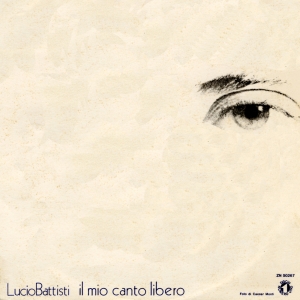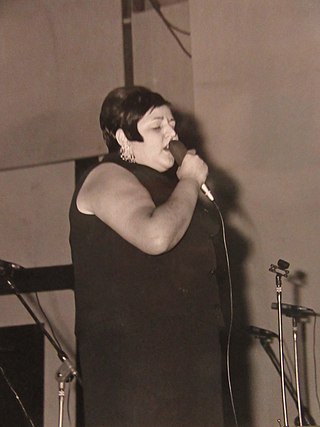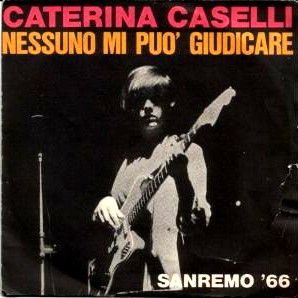
Marco Masini is an Italian singer-songwriter, musician and pianist.

Mina Anna Mazzini or Mina Anna Quaini, known mononymously as Mina, is an Italian singer and actress. She was a staple of television variety shows and a dominant figure in Italian pop music from the 1960s to the mid-1970s, known for her three-octave vocal range, the agility of her soprano voice, and her image as an emancipated woman.

Gian Luigi "Gianni" Morandi is an Italian pop singer, actor and entertainer. It is estimated that Morandi has sold about 50 million recordings.

Giuseppa Marcella Bella, known as just Marcella Bella or simply Marcella, is an Italian pop singer with a career spanning six decades. Her repertoire includes several songs composed by her brother Gianni.

Canzonissima '68 is a studio album by Italian singer Mina, released in 1968 by PDU and distributed by Durium.

Studio Uno is a studio album by Italian singer Mina, released in March 1965 by Ri-Fi. All songs were performed during the Saturday TV show Studio Uno. Thanks to such super hits as "Città vuota", "È l'uomo per me", "Un anno d'amore", "Un buco nella sabbia", "Io sono quel che sono" e "L'ultima occasione", the record reached the top of the Italian chart.
Vito Pallavicini was an Italian lyricist.

Elio Cesari, known by his stage name Tony Renis, is an Italian singer, composer, music producer, and film actor.

Antonio Lardera, better known by his stage name Tony Dallara, is an Italian former singer, actor and television personality.

"Il mio canto libero" is a song written by Italian singer-songwriter Lucio Battisti and lyricist Mogol. The song was recorded by Battisti for the album of the same title, and released as a single in November 1972 for Mogol's recording label Numero Uno. The song was a commercial success in Italy, topping the Musica e dischi singles chart for nine consecutive weeks in 1973 and becoming the third best-selling single of the year. During the following years, it was covered by several artists, and it became a classic of Italian popular music. It was certified double platinum by the Federation of the Italian Music Industry in 2024, for domestic equivalent sales exceeding 200,000 units since 2009.

"Il cielo in una stanza" is a song written by Gino Paoli and originally recorded by Italian singer Mina for the album of the same name. The song was released as a single in June 1960 by Italdisc. It became a commercial success in Italy, topping the charts for eleven consecutive weeks and later returning to number one for three additional weeks. It is also Mina's best-selling single in Italy, with estimated sales of 400.000 copies.

Luciana Turina is an Italian singer, actress and television personality.

Sandro Giacobbe is an Italian singer-songwriter.

Antonio Diodato, known simply as Diodato, is an Italian singer-songwriter. He won the 70th edition of the Sanremo Music Festival with the song "Fai rumore" and was scheduled to represent Italy in the Eurovision Song Contest 2020 in Rotterdam before the event's cancellation due to the COVID-19 pandemic.

"Nessuno mi può giudicare" is an Italian pop song written by Luciano Beretta, Miki Del Prete, Daniele Pace and Mario Panzeri. The song premiered at the sixteenth edition of the Sanremo Music Festival, and was performed by Caterina Caselli and Gene Pitney, finishing second.

"Ma che freddo fa" is a 1969 song composed by Claudio Mattone (music) and Franco Migliacci (lyrics). The song premiered at the 19th edition of the Sanremo Music Festival with a double performance of Nada and The Rokes, placing at the fifth place. The first verses include a citation of Donovan's "Laléna". Nada's version was a massive success, selling about one million copies, mainly in the Italian and Spanish markets.

Germana Caroli was an Italian singer, mainly active in the 1950s.

"Nessuno" is a 1959 Italian song composed by Antonietta De Simone and Edilio Capotosti. The song premiered at the ninth edition of the Sanremo Music Festival, with a double performance by Wilma De Angelis and Betty Curtis, and placed at the eighth place.

Carlo Alberto Rossi was an Italian composer and record producer.


















